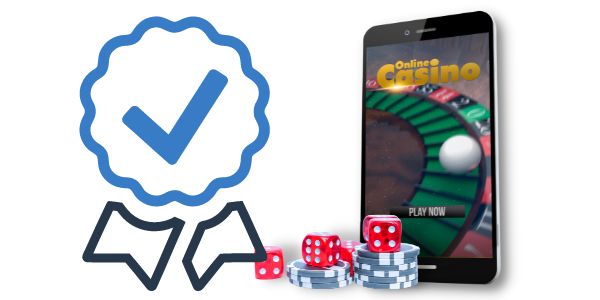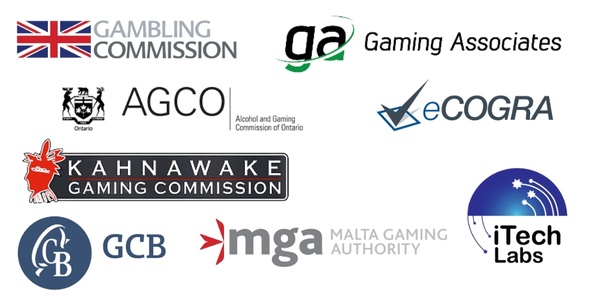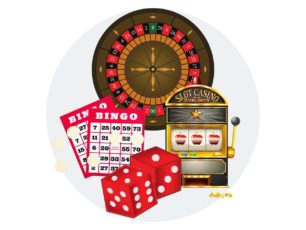What is Gambling Certification?
In its simplest form, gambling certification is a way for customers to know whether or not the website they are visiting offers a secure gambling platform and whether or not they are taking a risk by signing up and adding funds to their accounts there.
These certifications cover a wide variety of features of a casino, including the fairness of the games and the responsible gambling mechanisms the operator has in place to safeguard players who are more susceptible to gambling addiction.
If it wasn’t already obvious, the “risk” we are referring to here is nothing like the typical risk of losing money as we expect from playing any gambling game. Instead, what gambling certification aims to minimize is the risk of players losing their money to unfair or even illegal practices by both casino -side operators and the games they play on them.

Why does it matter?
You may have seen pieces in the news pop up every so often about a gambler going to court to challenge a gaming operator that had allegedly not paid out their winnings to the gambler fairly.
This is why gambling certification is such a big deal for gamblers today. By providing credentials, authority, and reputation to the gambling industry, players in Canada will now have easy waypoints or indicators to know where to play at and who to trust before they even make their first deposit.
Certifications in gambling, such as those offered by eCOGRA and other third-party testing organizations, are becoming increasingly important for operators of online gambling sites. It has even gotten to the point that online casino certification is not only something that is desirable, but is actually expected by casino players nowadays.
As you can probably imagine, much of the driving force behind this is the competition in the gambling sector that only continues to heat up. For casino operators and developers alike, it is more difficult than ever before to win over customers without having some sort of certification from a trusted regulator.
Types of Gambling Certification
Gambling certification can be broken down into two distinct categories based on what it is that is being certified – the individual casino games that gamblers play or the online casino sites that host them. From here, we can dive a bit deeper into the exact processes that go into certification.
Casino Game Certification
When it comes to the likes of blackjack, roulette, online slots, video poker and online casino games in general, the expectation that gamblers in Canada have is that the games play fairly. To be more specific, a casino game can be considered “fair” if all of the mechanisms that produce the randomness in the game operate according to their mathematical models and other predetermined benchmarks. As with all online casino games, though, there are a couple of caveats:
- Because of the way their math is designed, casino games have some partial bias towards the casino. This is known as RTP or Return to Player in online casino games (or the house edge, if you are more familiar with their land-based counterparts).
- Because computers and, by extension, computer programs are deterministic, there is no such thing as a truly random casino game. To this end, casino game developers make use of RNGs or random number generators, to provide a close enough parallel of randomness in the processing of their games, such as in slot reels, roulette ball landings, and the cards that come into and out of play. (If you want to learn more about them, we have a dedicated page going into more detail about casino game randomness here.)
The tests for casino game certification are carried out on two sides: the supplier or developer side and the vendor or operator side. The supplier test is done to make sure that the developers’ claims about the product’s specifications are true. Additionally, the tests are carried out on the vendor’s side to ensure that the operator has not tampered with the product and is being honest with the players.
RTP
RTP, which stands for “return to player,” is an acronym that refers to a percentage that indicates the expected ratio between the payouts dispensed by a gaming machine (especially slots) and the amount staked by customers playing it.
The average Return to Player is a percentage that indicates this ratio. Operators are required by regulated countries to post a list indicating the RTP % for each machine that is accessible through their website. This is done in the interest of promoting transparency.
However, the RTP is computed based on tens of thousands of games, which means that consumers can’t expect individual playing sessions to have a return that is equivalent to the ratio that is announced. As such, they have no way to actually tell that the percentages that are presented are accurate.
Independent testing organizations become relevant at this point in the process. After ensuring that the machine logs are accurate, they examine the patterns of payments to see whether or not these patterns are consistent with the RTPs that have been advertised for the machines. In most cases, examinations of this kind are carried out on a regular basis.
RNG
The production of random numbers lies at the heart of the online gaming business. It is essential to use a RNG, otherwise known as a random number generator, which is a set of codes in software that can produce a series of numbers that cannot be anticipated with any degree of accuracy. Each collection of numbers that is generated by the RNG is then translated into a distribution of symbols that will display on the reels of a slot machine after a spin or the hand that will be dealt in a card game.
When we talk about “certified games,” we are often talking about titles whose random number generator (RNG) has been tested and confirmed on the provider side. These games are supplied by game creators.
RTP testing is a solid method for measuring the fairness of slots because it does not involve any action on the part of the player to achieve a result. On the other hand, given that player actions can affect the RTP of a game, such a tool is ineffective when applied to card games, for instance. Verifying the operation of a machine’s random number generator (RNG) is the best technique to ensure that these types of games are played fairly.
Audits of random number generators (RNGs) are carried out by contrasting the card distribution and the occurrence of certain events recorded in a machine’s logs with their respective theoretical probability. Similarly, this kind of test may be carried out on dice games such as online craps and ball games like bingo in order to validate their fairness.
Online Casino Sites
The process for verifying online casino sites, meanwhile, is a bit different. Because of the complex nature of this process, we will spare you the long and gritty details of it. However, you may be more familiar with casino site certification under its other names, the casino license or the gaming license.
Any given gaming license covers a wide range of a casino site’s operations, which is the main reason why it is so complex. From a general standpoint, though, they are meant to suppress any and all illegal activities, particularly that of money laundering; provide gaming that is both honest and open; and protect underage and vulnerable people from problem gambling.
It is important to note that the different regulatory bodies will have different sets of requirements to meet before issuing a license. In order to do so, any given online casino operator must prove that they can provide:
- full and transparent disclosure of the owners and operators of the online casino, along with conducting background checks on each individual;
- a complete absence of any criminal history;
- a history in business that has been verified to be honest and in good moral standing;
- documentation demonstrating that sufficient finances are available to support the ongoing operation of the firm; and
- proof that the operator possesses the necessary skills and years of industry expertise to successfully operate a gaming enterprise.
In the event that an operator does not comply with the requirements, they risk being penalized and/or losing their license.
Casino Certification Bodies
Now that we are well acquainted with how casino games are certified, let us now get to know the organizations responsible for giving out those casino certifications.
-
eCOGRA (eCommerce Online Gaming Regulation and Assurance)
If you are the type who already pays attention to casino certification, you likely already recognize the eCOGRA name. Known to be the oldest and most well-known third-party certification body for the worldwide gambling business, eCOGRA was established in the United Kingdom in 2003 and has its headquarters in London.
eCOGRA is internationally recognized for its integrity over the years, as well as its industry-leading inspection and certification processes for both web-based gaming software and casino information security management systems. Validation from this firm is generally accepted to be a strong indicator of good software.
-
Gaming Associates
Gaming Associates is another globally recognized third-party auditing firm for the online gambling industry that specialises in compliance checking and information security for online casino operators. Accredited by half a dozen firms on industrial standards compliance, operators given a pass from Gaming Associates can proudly present their certification to players.
-
iTech Labs
iTech Labs is a world-class testing and certification facility that has been in business since 2004. It was one of the first places to test and certify online gaming systems. The firm provides their testing services from numerous sites across Australia, Asia, and Europe in order to boost throughput and serve a greater number of online casino operators around the world.
-
Government Regulators
Besides the third-party certification firms we’ve listed above, some of the most important and consequential casino verification bodies are, in fact, the departments and offices installed by governments to regulate the casino markets in their respective countries. Unless you are completely new to online casinos, you will have already seen a few of the following names being thrown around:
- UK Gambling Commission
- Malta Gaming Authority
- Alcohol and Gaming Commission of Ontario
- Kahnawake Gaming Commission
- Curaçao Gaming Control Board
Just like independent auditors, all of these government online gambling regulators perform stringent and thorough compliance checks on every aspect of their applicants’ operations. From information security to policy reviews and financials, no stone is left unturned to ensure that the online casino operators are actually able to deliver on their promises.
Unlike independent bodies, though, certification from a government regulator, which we might recognize as a “casino license,” is required of any new online casino site that wants to open their services to regulated regions. Any operator that does not have at least one of these licenses is likely operating outside of the law and should not be trusted.

Wrap-Up: Verifying the Verified
With all of this said and done, however, there is one more question that lingers: how are we supposed to know if the accreditation logos that an online casino shows are actually legitimate? After all, it can't be too hard to, for instance, plaster an "eCOGRA Certified" logo at the bottom of your online casino page.
All online casino sites and developers that have a gaming license or third-party verification are now required to provide their certifications at the bottom of the casino page with a link to the verifier.
A good alternative would be to check our verified casino reviews such as the ones we have here at InsideCasino, since we always check for the latest information and regularly update our reviews when certain details change.





